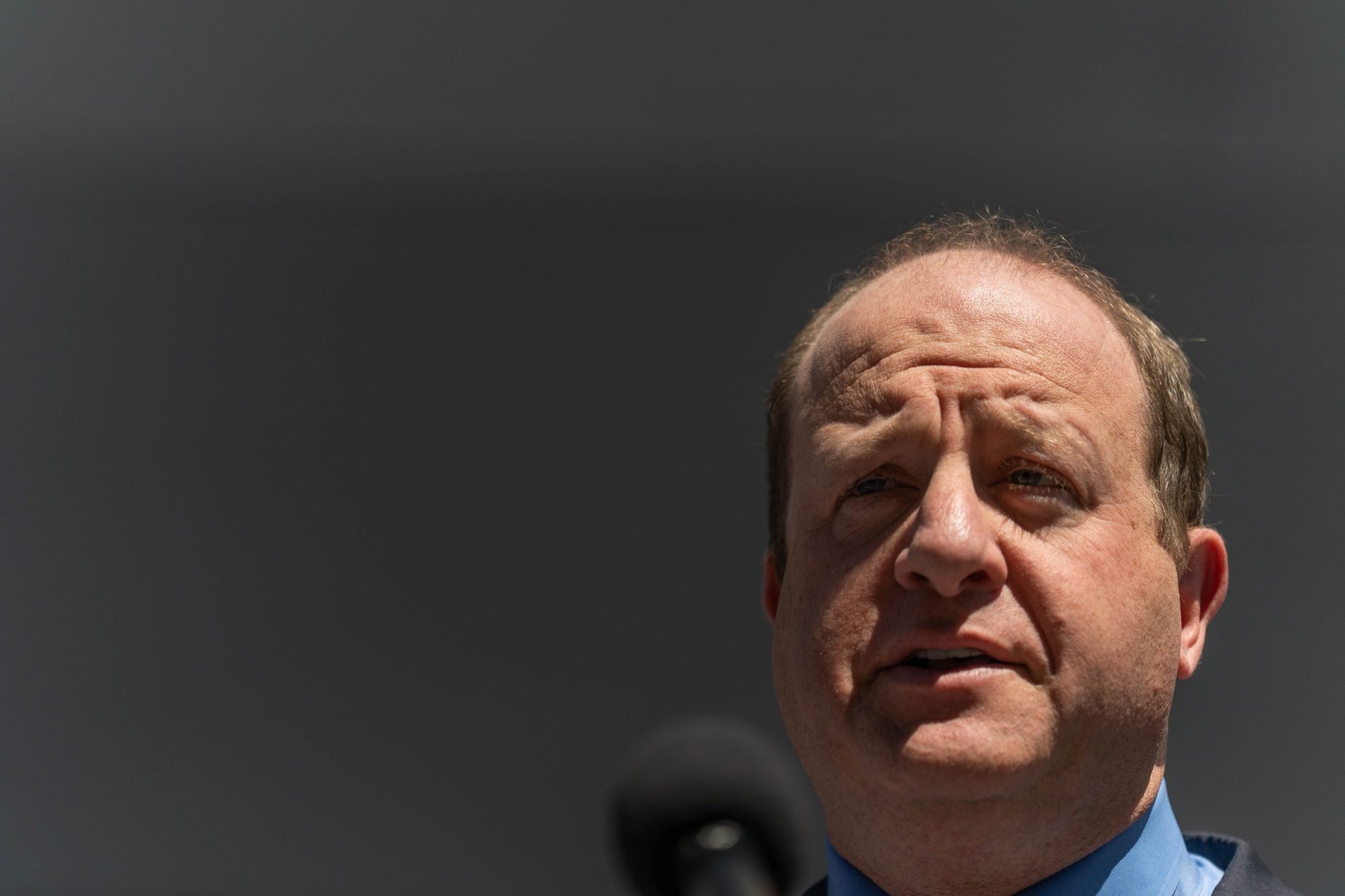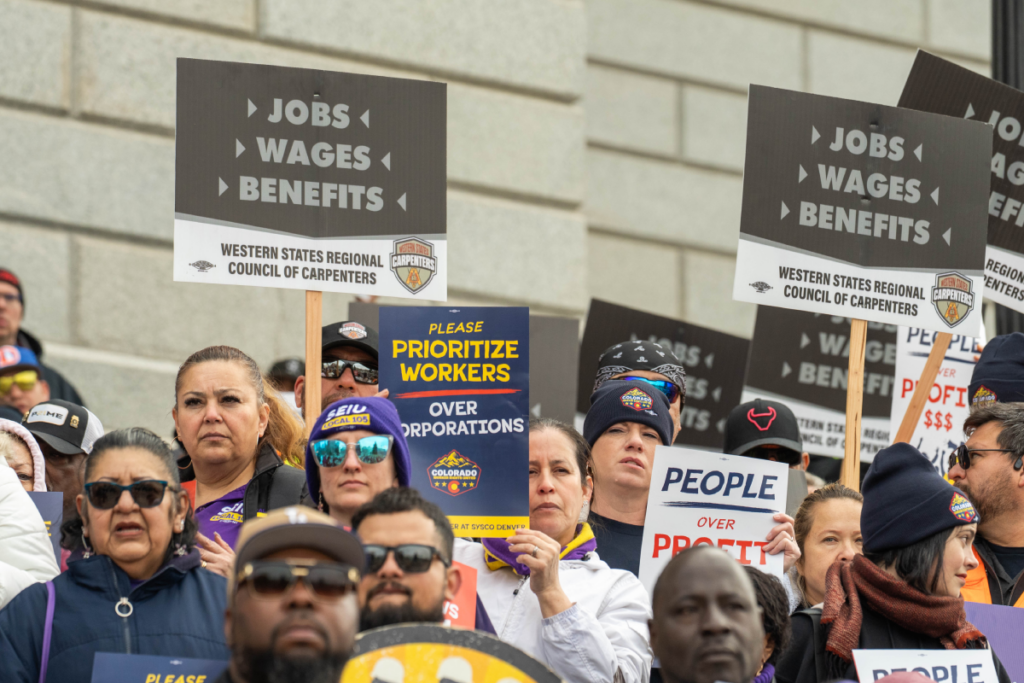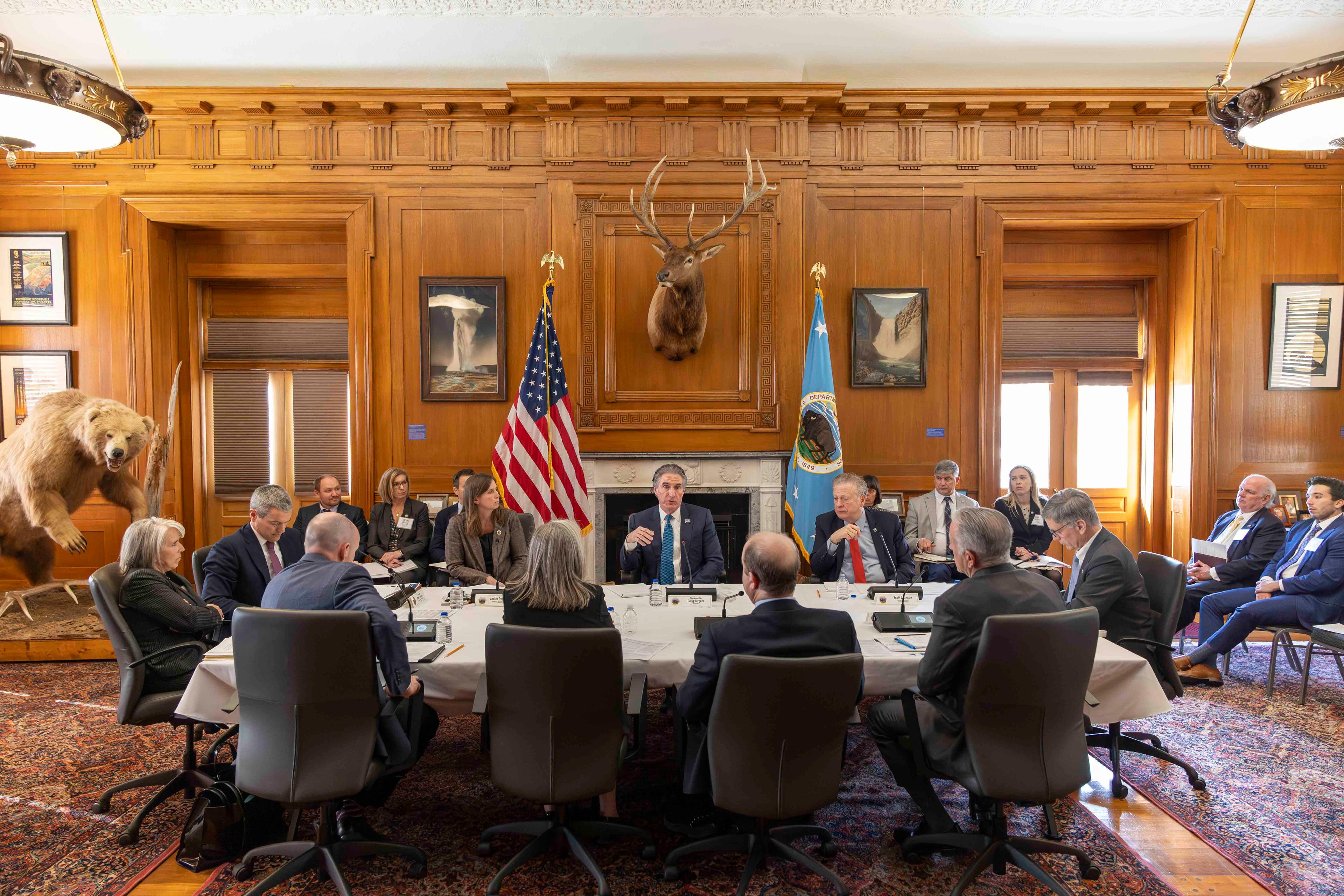
This story was produced as part of the Colorado Capitol News Alliance. It first appeared at coloradosun.com.
Gov. Jared Polis made his expected veto of Senate Bill 5 official on Friday, a decision that’s sure to deepen the rift between him and the Colorado labor movement, as well as Democrats in the legislature.
The measure would have abolished a requirement in the Colorado Labor Peace Act that 75% of workers at a company sign off before unions can negotiate with businesses over union security. That’s after a majority of workers vote to unionize.
Union security is the term for when workers are forced to pay fees for collective bargaining representation — regardless of whether they are members of their workplace’s union. Unions are required to bargain on behalf of all workers at a company, including nonmembers. That’s why unions feel it’s only fair that union security be imposed to cover the cost of things like lawyers and negotiating experts.
Repealing the union security vote requirement has long been a priority for Colorado’s labor movement. In 2007, when Democrats controlled the legislature by narrower margins, they passed a measure similar to Senate Bill 5. But then-Gov. Bill Ritter, a Democrat, vetoed the legislation. In his veto letter, Ritter wrote that he felt the proposal would ultimately hurt Colorado’s economy and make it harder to attract new businesses.
Polis has long said he opposes eliminating the union security election, saying that workers have a right to weigh in on whether they pay union representation fees.
“I am pro-union, pro-worker and have worked throughout my career in public service to protect the right of workers to organize,” Polis wrote in a letter explaining his veto. “The Labor Peace Act is unique in that it creates a system that both balances the power employees gain in joining a union and the rights of individual workers to continue to have a say in mandatory payroll deduction. It is also unique in that for decades it has created ‘peace’ and stability between employers and unions, which is beneficial to workers and businesses in its own right.”
Democrats in the legislature tried to reach a compromise on Senate Bill 5 with the labor movement, business leaders and Polis. Those negotiations fell apart, however, and lawmakers passed Senate Bill 5 as it was introduced and urged Polis to sign it.
The governor said despite his veto of Senate Bill 5, he’s willing to work on the issue in the future.
“People were not too far apart, but still far enough to avoid getting a (deal),” he said. “I don’t even want to use the word ‘compromise,’ because I truly believe the bill that I could sign would be better for workers and better for business.”
Senate Bill 5 passed the Senate 22-12 along party lines and the House 43-22 also along party lines.
Labor leaders have vowed to use the governor’s veto of Senate BIll 5 as a line of attack should he decide to run for president or another higher office in 2028. (Polis is term-limited come early 2027.)

The governor said Thursday he’s not worried about how vetoing Senate Bill 5 will affect his political future and instead emphasized the importance of remaining consistent in his position.
“It would be political suicide if I were to sign the bill,” Polis said at The Colorado Sun’s post-legislative session event held at the University of Denver. “Because obviously I said we were going to veto it. Labor knew when they introduced it where we were. My governorship would be over if I were to sign it. I’m sure they understand that.”
Dennis Dougherty, who leads the Colorado AFL-CIO, said the labor movement will keep trying to repeal the union security vote. Union leaders think Colorado’s next governor, likely a Democrat, will follow through.
“While this veto is a setback, it’s not the end of the road — it’s the beginning of the next phase,” Dougherty said Thursday in a written statement. “Working people are taking this fight directly to the ballot in 2026, where Coloradans can choose to stand with workers and finally end unjust firings and union-busting tactics. This ballot measure will be a defining moment in our fight for fairness and dignity on the job and help create a more just and sustainable Colorado for everyone.”
The Working Families Party, a progressive group, blasted Polis for vetoing the measure.
“This veto from Governor Polis is a betrayal of working people in Colorado -- but also one we are not surprised about,” Colorado Working Families Party State Director Wynn Howell said in a written statement. “Given that he is one of the wealthiest men in Colorado, it is no shock that he is woefully out of touch with public opinion on this question — he needs to get outside of his rich man's bubble a whole lot more.”
The business community has been complimentary of Polis’ work to prevent Senate Bill 5 from becoming law.
“Our strongest backstop on business issues — the most radical ideas this session — will only be governor for 18 more months,” J.J. Ament, president and CEO of the Denver Metro Chamber of Commerce, told hundreds of business leaders this week at the chamber’s annual State of the State event recapping the legislative session. “Without his leadership, frankly, and insistence on good faith negotiations, this bill may have passed in the first month.”
The next big labor fights could be at the ballot box
Unions are also trying to make Colorado the second “just-cause employment” state in the U.S.
Initiative 43, which would be on the 2026 ballot if its backers collect enough voter signatures, would prohibit companies with more than eight employees from firing or suspending a worker without just cause, which is defined in the measure as substandard performance, material neglect, repeated policy violation and gross insubordination. Conviction of a crime of “moral turpitude” — like murder, kidnapping and sexual assault — and an employer’s financial instability would also constitute just cause under the initiative.
Colorado, like 48 other states, is currently an at-will employment state, meaning an employer can fire a worker at any time for any reason or no reason at all. The exception is for employees who are working under a contract. And an employer cannot fire a worker for their age, race, sex, a disability or their religion.
Initiative 43 is a long way from appearing on the 2026 ballot. Submitting a ballot initiative to Legislative Council Staff is the first step. Proposals then must be vetted by the state’s Title Board. Then, proponents must gather some 125,000 voter signatures to make the ballot.
Making the ballot typically costs about $2 million.
There are other labor measures being pursued for the 2026 ballot.
Jon Caldara, who leads the libertarian Independence Institute, is behind a proposal that would make Colorado a right-to-work state. The measure would amend the state constitution to prohibit employees from being forced to pay collective bargaining representation fees if they aren’t in a union. It was a direct response to the Labor Peace Act repeal effort.
Getting a measure on the ballot that amends the state constitution is more difficult.
Proponents must still gather some 125,000 voter signatures, but those signatures must include at least 2% of the registered voters in each of the state’s 35 state Senate districts. The measure would then require at least 55% of the vote to pass.
Two other Friday vetoes
The governor rejected two other bills Thursday: House Bill 1065 and House Bill 1147.
House Bill 1065 would have let people 72 years old or above opt out of jury duty. House Bill 1147 would have set the maximum penalty for violating a municipal ordinance to the equivalent sentence for violating a comparable state-level law.
Polis has vetoed five bills so far that were passed during the 2025 legislative session. The record number of vetoes he’s issued in a year is 10.
This story was produced by the Capitol News Alliance, a collaboration between KUNC News, Colorado Public Radio, Rocky Mountain PBS and The Colorado Sun, and shared with Rocky Mountain Community Radio and other news organizations across the state. Funding for the Alliance is provided in part by the Corporation for Public Broadcasting.
Funding for public media is at stake. Stand up and support what you value today.







